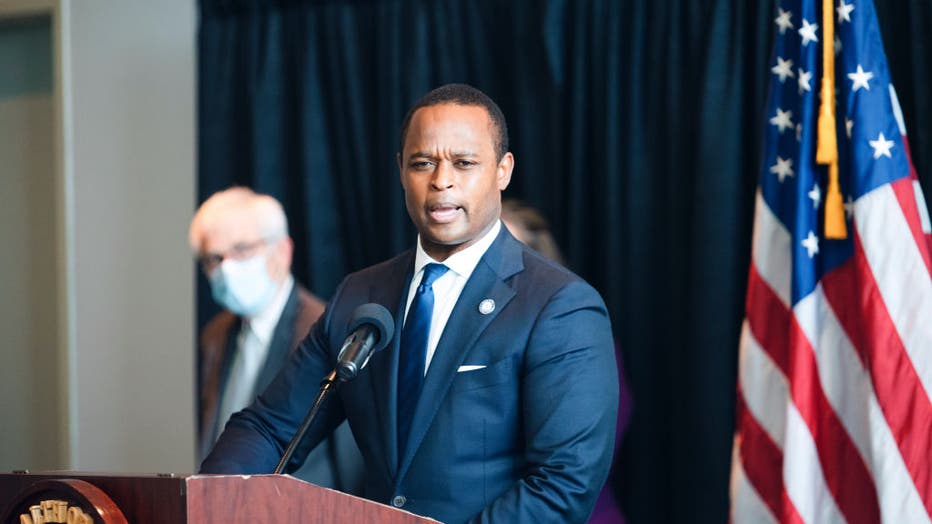CVS sued for ‘role’ in opioid epidemic by Kentucky’s attorney general
FRANKFORT, Ky. - Kentucky Attorney General Daniel Cameron on Wednesday filed a lawsuit against CVS Health for its alleged role in the state’s opioid epidemic.
Cameron announced the filing of the lawsuit on his social media platforms, claiming that for approximately eight years CVS pharmacies contributed to the distribution of highly addictive opioid drugs including oxycodone and hydrocodone into the community resulting in drug overdoses and deaths.
"As both distributor and pharmacy, CVS was in a unique position to monitor and stop the peddling of these highly-addictive drugs from their stores, yet they ignored their own safeguard systems," Cameron said in a news release.
"During the height of the opioid epidemic, CVS allowed millions of dosage units of opioids to flood Kentucky’s borders, fueling the crisis and devastating thousands of families and communities across the Commonwealth," Cameron said.
Cameron’s office says the legal action is an attempt to hold companies accountable that he says helped supply a massive pipeline of prescription pills into Kentucky. In 2015, drug overdoses accounted for about 60% of Kentucky’s statewide accidental deaths, Cameron said.

FILE - Kentucky Attorney General Daniel Cameron speaks during a press conference.
CVS Health, which operates one of the nation's largest drugstore chains, said it's prepared to defend itself against the state's allegations.
"Opioids are made and marketed by drug manufacturers, not pharmacies," the company said. "Pharmacists dispense opioid prescriptions written by licensed physicians for a legitimate medical need. Pharmacists do not — and cannot — write prescriptions. Nor do they — or can they — examine patients, conduct tests, diagnose medical conditions or determine medical treatment. That is the role of physicians, who have the responsibility to write appropriate prescriptions."
Cameron argues that CVS participated in unlawful business practices at the expense of thousands of lives.
Cameron alleged that one CVS store in Perry County, located just over 100 miles south of Lexington, purchased over 6.87 million dosage units of oxycodone and hydrocodone in 2006 to 2014, which he said is enough to supply each resident of the Appalachian county to have more than 26 pills every year during the same period.
Despite supplying "staggering quantities" of opioids in Kentucky, CVS reported zero suspicious orders for its Kentucky stores from 2007 to 2014, Cameron said. Even during the height of the opioid epidemic, CVS helped promote opioid products, he said.
CVS said Wednesday that it has been involved in the fight against prescription opioid abuse. The company developed educational programs for patients and providers, created thousands of safe medication disposal sites and expanded access to life-saving overdose reversal drugs, it said.
Drug overdose deaths spiked nationally and in Kentucky during the early months of the COVID-19 pandemic. In Kentucky, overdose deaths rose by 50% from September 2019 to September 2020, compared with the previous 12 months, according to preliminary figures released in April by the U.S. Centers for Disease Control and Prevention, the Courier Journal reported. Addiction experts say the pandemic left people stressed and isolated, disrupted treatment and recovery programs, and contributed to an increasingly dangerous illicit drug supply.
On May 6, West Virginia’s former health commissioner described a culture of doctors for years writing more opioid prescriptions for their patients than necessary in a landmark trial in which local governments accuse three large drug distributors, AmerisourceBergen Drug Co., Cardinal Health Inc. and McKesson Corp, of fueling the U.S. opioid epidemic.
Similar lawsuits have resulted in multimillion-dollar settlements, but this is the first time allegations have wound up at federal trial. The result could have huge effects on hundreds of similar lawsuits that have been filed across the country.
Cabell County and the city of Huntington argue that drug distributors AmerisourceBergen Drug Co., Cardinal Health Inc. and McKesson Corp created a "public nuisance" by flooding the area with 80 million opioid doses over eight years and ignoring the signs that the community was being ravaged by addiction.
In separate, similar lawsuits, West Virginia reached a $37 million settlement with McKesson in 2019 and $20 million with Cardinal Health and $16 million with AmerisourceBergen in 2017.
This story was reported from Los Angeles. The Associated Press contributed.

